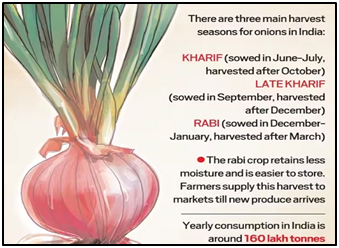Why in news?
- Recently, the government issued a notification and set the minimum export price (MEP) for onions at $800 per metric tonne.
- This comes after the 40 per cent export duty imposed on onions in August 2023.
- This has been done to ensure sufficient availability of onion for domestic consumers and keep the prices for the produce at affordable levels.
What’s in today’s article?
- Production of Onion in India
- News Summary
Production of Onion in India
- Background
- India is the second-largest onion-growing country in the world. The Indian onions are famous for their pungency and are available round the year.

- The choice of season depends on the region's climate and the onion variety being cultivated. Onions are more commonly associated with the Rabi season.
- Varieties
- India cultivates various onion varieties, with the most common ones being red onions and white onions.
- There are certain varieties of yellow onion which are suitable for export in European countries.
- Cultivation Practices
- Onions are primarily grown through seeds, although bulb-to-bulb planting is also practiced.
- The crop requires well-drained soil and is often cultivated in sandy or loamy soils.
- Adequate irrigation is essential, and farmers may use drip irrigation systems to conserve water.
- Onion producing states
- The Major Onion producing states are Maharashtra, Karnataka, Madhya Pradesh, Gujarat, Bihar, Andhra Pradesh, Rajasthan, Haryana and Telangana.
- Maharashtra ranks first in Onion production.
- Export
- The country has exported 2,525,258.35 MT of fresh onion to the world, worth Rs. 4,522.79 crores during the year 2022-23.
- Major Export Destinations (2022-23):Bangladesh, Malaysia, UAE, Sri Lanka, Nepal and Indonesia.
News Summary: Govt Sets Minimum Export Price for Onions
- Trying to rein in soaring onion prices, the central government imposed a steep Minimum Export Price (MEP) of $800 per metric tonne.
- The MEP would be in place till December 30, 2023.
Rationale behind this step
- Onions from the buffer stock have been disposed continuously from August second week in major consumption centres across the country. As a result, the quantity of stored onions is declining.
- Till date, about 1.70 lakh metric tonnes of onions have been disposed of from the buffer.
- The continuous procurement and disposal of onion from the buffer are undertaken to moderate its prices for consumers while ensuring remunerative prices to the onion farmers.
- Hence, the measure has been taken to maintain sufficient availability of onion for domestic consumers at affordable prices.
- The central government would also procure an additional 2 lakh tonnes as buffer stock in addition to the 5 lakh tonnes already procured last year.
Rising Onion Price
- Onion prices, however, have been on the rise ever since and have started touching the sky in October.
- The first two weeks of October witnessed the average wholesale price of onions in the key Lasalgaon APMC in Maharashtra increase more than 60%.
- The recent price rise is attributed to low stock and late arrival of the new crop.
- Earlier this year, farmers had lost around 60 per cent of their summer crop to untimely hail and rain.
- The kharif crop, which is transplanted in June-July, was delayed due to the delay in monsoons. The long break in August has also affected the crop.
- The new crop, which normally arrives early October, is delayed and would arrive only mid-November. Prices will remain on the higher side till the new crop arrives.










